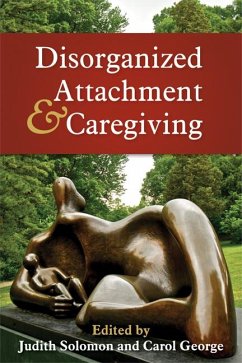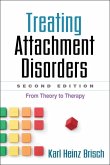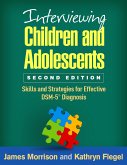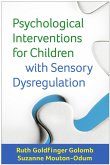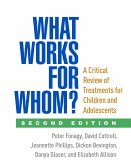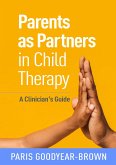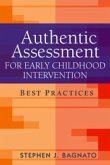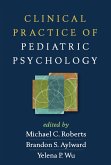Disorganized Attachment and Caregiving
Herausgeber: Solomon, Judith; George, Carol
Disorganized Attachment and Caregiving
Herausgeber: Solomon, Judith; George, Carol
- Gebundenes Buch
- Merkliste
- Auf die Merkliste
- Bewerten Bewerten
- Teilen
- Produkt teilen
- Produkterinnerung
- Produkterinnerung
In this volume, leading authorities provide a state-of-the-art examination of disorganized attachment: what it is, how it can be identified, and its links to behavioral problems and psychological difficulties in childhood and beyond. The editors offer a fresh perspective on disorganized attachment, not as a characteristic of the infant or child but as the product of a dysregulated and disorganized parent-child relationship. They present cutting-edge research and exemplary treatment approaches. With attention to the subjective experiences of both mothers and children, the book shows how…mehr
Andere Kunden interessierten sich auch für
![Treating Attachment Disorders Treating Attachment Disorders]() Karl Heinz BrischTreating Attachment Disorders79,99 €
Karl Heinz BrischTreating Attachment Disorders79,99 €![Interviewing Children and Adolescents Interviewing Children and Adolescents]() James MorrisonInterviewing Children and Adolescents79,99 €
James MorrisonInterviewing Children and Adolescents79,99 €![Psychological Interventions for Children with Sensory Dysregulation Psychological Interventions for Children with Sensory Dysregulation]() Ruth Goldfinger GolombPsychological Interventions for Children with Sensory Dysregulation37,99 €
Ruth Goldfinger GolombPsychological Interventions for Children with Sensory Dysregulation37,99 €![What Works for Whom? What Works for Whom?]() Peter FonagyWhat Works for Whom?96,99 €
Peter FonagyWhat Works for Whom?96,99 €![Parents as Partners in Child Therapy Parents as Partners in Child Therapy]() Paris Goodyear-BrownParents as Partners in Child Therapy68,99 €
Paris Goodyear-BrownParents as Partners in Child Therapy68,99 €![Authentic Assessment for Early Childhood Intervention Authentic Assessment for Early Childhood Intervention]() Stephen J BagnatoAuthentic Assessment for Early Childhood Intervention68,99 €
Stephen J BagnatoAuthentic Assessment for Early Childhood Intervention68,99 €![Clinical Practice of Pediatric Psychology Clinical Practice of Pediatric Psychology]() Clinical Practice of Pediatric Psychology63,99 €
Clinical Practice of Pediatric Psychology63,99 €-
-
-
In this volume, leading authorities provide a state-of-the-art examination of disorganized attachment: what it is, how it can be identified, and its links to behavioral problems and psychological difficulties in childhood and beyond. The editors offer a fresh perspective on disorganized attachment, not as a characteristic of the infant or child but as the product of a dysregulated and disorganized parent-child relationship. They present cutting-edge research and exemplary treatment approaches. With attention to the subjective experiences of both mothers and children, the book shows how focusing on the caregiving system can advance research and clinical practice.
Hinweis: Dieser Artikel kann nur an eine deutsche Lieferadresse ausgeliefert werden.
Hinweis: Dieser Artikel kann nur an eine deutsche Lieferadresse ausgeliefert werden.
Produktdetails
- Produktdetails
- Verlag: Guilford Publications
- Seitenzahl: 427
- Erscheinungstermin: 14. April 2011
- Englisch
- Abmessung: 235mm x 161mm x 37mm
- Gewicht: 722g
- ISBN-13: 9781609181284
- ISBN-10: 160918128X
- Artikelnr.: 32039662
- Herstellerkennzeichnung
- Libri GmbH
- Europaallee 1
- 36244 Bad Hersfeld
- gpsr@libri.de
- Verlag: Guilford Publications
- Seitenzahl: 427
- Erscheinungstermin: 14. April 2011
- Englisch
- Abmessung: 235mm x 161mm x 37mm
- Gewicht: 722g
- ISBN-13: 9781609181284
- ISBN-10: 160918128X
- Artikelnr.: 32039662
- Herstellerkennzeichnung
- Libri GmbH
- Europaallee 1
- 36244 Bad Hersfeld
- gpsr@libri.de
Judith Solomon, PhD, is Director of Training for the Child FIRST Program at Bridgeport Hospital in Bridgeport, Connecticut. She is internationally recognized for her pioneering research in attachment and caregiving, including (with Mary Main) the discovery and delineation of the disorganized attachment classification group and the first longitudinal study of infants in separated and divorced families. With Carol George, she developed key representational measures of caregiving and child attachment, including the Caregiving Interview and the Attachment Doll Play Projective Assessment. In addition to her research and theoretical contributions, Dr. Solomon is also a practicing clinical psychologist, providing consultation, supervision, and training in attachment-based assessment and intervention for infants and young children. Carol George, PhD, is Lee Mirmow Professor of Psychology at Mills College in Oakland, California. The author of numerous research articles and book chapters on adult and child attachment and caregiving, Dr. George has been at the forefront of developing attachment assessments for children and adults, including the Attachment Doll Play Projective Assessment, the Caregiving Interview, the Adult Attachment Interview, and the Adult Attachment Projective Picture System. She teaches courses in development and attachment, codirects a master's degree program in infant mental health, and trains and consults on the application of attachment assessment in research and clinical settings.
I. Core Questions: Etiology
Continuity
and Developmental Transformation 1. The Disorganized Attachment-Caregiving System: Dysregulation of Adaptive Processes at Multiple Levels
Judith Solomon and Carol George 2. Disorganization of Maternal Caregiving across Two Generations: The Origins of Caregiving Helplessness
Judith Solomon and Carol George 3. Understanding Disorganized Attachment at Preschool and School Age: Examining Divergent Pathways of Disorganized and Controlling Children
Ellen Moss
Jean-François Bureau
Diane St-Laurent
and George M. Tarabulsy 4. Continuity and Change in Unresolved Classifications of Adult Attachment Interviews with Low-Income Mothers
Susan Spieker
Elizabeth M. Nelson
Michelle DeKlyen
Sandra N. Jolley
and Lisa Mennet 5. Genetic and Environmental Determinants of Attachment Disorganization
Gottfried SpanglerII. New Directions 6. Caregiving Helplessness: The Development of a Screening Measure for Disorganized Maternal Caregiving
Carol George and Judith Solomon 7. Pathways from Disorganized Attachment to Later Social-Emotional Problems: The Role of Gender and Parent-Child Interaction Patterns
Nancy L. Hazen
Deborah Jacobvitz
Kristina N. Higgins
Sydnye Allen
and Mi Kyoung Jin 8. Disorganized Attachment Behavior Observed in Adolescence: Validation in Relation to Adult Attachment Interview Classifications at Age 25
Katherine H. Hennighausen
Jean-François Bureau
Daryn H. David
Bjarne M. Holmes
and Karlen Lyons-Ruth 9. Maternal Solicitousness and Attachment Disorganization among Toddlers with a Congenital Anomaly
Douglas Barnett
Melissa Kaplan-Estrin
Julie Braciszewski
Lesley Hetterscheidt
Jaclyn Issner
and Christine M. Butler III. Clinical Applications 10. Viewing Young Foster Children's Responses to Visits through the Lens of Maternal Containment: Implications for Attachment Disorganization
Teresa Ostler and Wendy Haight 11. An Exploratory Investigation of the Relationships among Representational Security
Disorganization
and Behavior Ratings in Maltreated Children
Linda Webster and Rachelle Kisst Hackett 12. The Circle of Security Intervention: Using the Therapeutic Relationship to Ameliorate Attachment Security in Disorganized Dyads
Caroline A. Zanetti
Bert Powell
Glen Cooper
and Kent Hoffman 13. Attachment Disorganization in Borderline Personality Disorder and Anxiety Disorder
Anna Buchheim and Carol George 14. Attachment Disorganization and the Clinical Dialogue: Theme and Variations
Giovanni Liotti
Continuity
and Developmental Transformation 1. The Disorganized Attachment-Caregiving System: Dysregulation of Adaptive Processes at Multiple Levels
Judith Solomon and Carol George 2. Disorganization of Maternal Caregiving across Two Generations: The Origins of Caregiving Helplessness
Judith Solomon and Carol George 3. Understanding Disorganized Attachment at Preschool and School Age: Examining Divergent Pathways of Disorganized and Controlling Children
Ellen Moss
Jean-François Bureau
Diane St-Laurent
and George M. Tarabulsy 4. Continuity and Change in Unresolved Classifications of Adult Attachment Interviews with Low-Income Mothers
Susan Spieker
Elizabeth M. Nelson
Michelle DeKlyen
Sandra N. Jolley
and Lisa Mennet 5. Genetic and Environmental Determinants of Attachment Disorganization
Gottfried SpanglerII. New Directions 6. Caregiving Helplessness: The Development of a Screening Measure for Disorganized Maternal Caregiving
Carol George and Judith Solomon 7. Pathways from Disorganized Attachment to Later Social-Emotional Problems: The Role of Gender and Parent-Child Interaction Patterns
Nancy L. Hazen
Deborah Jacobvitz
Kristina N. Higgins
Sydnye Allen
and Mi Kyoung Jin 8. Disorganized Attachment Behavior Observed in Adolescence: Validation in Relation to Adult Attachment Interview Classifications at Age 25
Katherine H. Hennighausen
Jean-François Bureau
Daryn H. David
Bjarne M. Holmes
and Karlen Lyons-Ruth 9. Maternal Solicitousness and Attachment Disorganization among Toddlers with a Congenital Anomaly
Douglas Barnett
Melissa Kaplan-Estrin
Julie Braciszewski
Lesley Hetterscheidt
Jaclyn Issner
and Christine M. Butler III. Clinical Applications 10. Viewing Young Foster Children's Responses to Visits through the Lens of Maternal Containment: Implications for Attachment Disorganization
Teresa Ostler and Wendy Haight 11. An Exploratory Investigation of the Relationships among Representational Security
Disorganization
and Behavior Ratings in Maltreated Children
Linda Webster and Rachelle Kisst Hackett 12. The Circle of Security Intervention: Using the Therapeutic Relationship to Ameliorate Attachment Security in Disorganized Dyads
Caroline A. Zanetti
Bert Powell
Glen Cooper
and Kent Hoffman 13. Attachment Disorganization in Borderline Personality Disorder and Anxiety Disorder
Anna Buchheim and Carol George 14. Attachment Disorganization and the Clinical Dialogue: Theme and Variations
Giovanni Liotti
I. Core Questions: Etiology
Continuity
and Developmental Transformation 1. The Disorganized Attachment-Caregiving System: Dysregulation of Adaptive Processes at Multiple Levels
Judith Solomon and Carol George 2. Disorganization of Maternal Caregiving across Two Generations: The Origins of Caregiving Helplessness
Judith Solomon and Carol George 3. Understanding Disorganized Attachment at Preschool and School Age: Examining Divergent Pathways of Disorganized and Controlling Children
Ellen Moss
Jean-François Bureau
Diane St-Laurent
and George M. Tarabulsy 4. Continuity and Change in Unresolved Classifications of Adult Attachment Interviews with Low-Income Mothers
Susan Spieker
Elizabeth M. Nelson
Michelle DeKlyen
Sandra N. Jolley
and Lisa Mennet 5. Genetic and Environmental Determinants of Attachment Disorganization
Gottfried SpanglerII. New Directions 6. Caregiving Helplessness: The Development of a Screening Measure for Disorganized Maternal Caregiving
Carol George and Judith Solomon 7. Pathways from Disorganized Attachment to Later Social-Emotional Problems: The Role of Gender and Parent-Child Interaction Patterns
Nancy L. Hazen
Deborah Jacobvitz
Kristina N. Higgins
Sydnye Allen
and Mi Kyoung Jin 8. Disorganized Attachment Behavior Observed in Adolescence: Validation in Relation to Adult Attachment Interview Classifications at Age 25
Katherine H. Hennighausen
Jean-François Bureau
Daryn H. David
Bjarne M. Holmes
and Karlen Lyons-Ruth 9. Maternal Solicitousness and Attachment Disorganization among Toddlers with a Congenital Anomaly
Douglas Barnett
Melissa Kaplan-Estrin
Julie Braciszewski
Lesley Hetterscheidt
Jaclyn Issner
and Christine M. Butler III. Clinical Applications 10. Viewing Young Foster Children's Responses to Visits through the Lens of Maternal Containment: Implications for Attachment Disorganization
Teresa Ostler and Wendy Haight 11. An Exploratory Investigation of the Relationships among Representational Security
Disorganization
and Behavior Ratings in Maltreated Children
Linda Webster and Rachelle Kisst Hackett 12. The Circle of Security Intervention: Using the Therapeutic Relationship to Ameliorate Attachment Security in Disorganized Dyads
Caroline A. Zanetti
Bert Powell
Glen Cooper
and Kent Hoffman 13. Attachment Disorganization in Borderline Personality Disorder and Anxiety Disorder
Anna Buchheim and Carol George 14. Attachment Disorganization and the Clinical Dialogue: Theme and Variations
Giovanni Liotti
Continuity
and Developmental Transformation 1. The Disorganized Attachment-Caregiving System: Dysregulation of Adaptive Processes at Multiple Levels
Judith Solomon and Carol George 2. Disorganization of Maternal Caregiving across Two Generations: The Origins of Caregiving Helplessness
Judith Solomon and Carol George 3. Understanding Disorganized Attachment at Preschool and School Age: Examining Divergent Pathways of Disorganized and Controlling Children
Ellen Moss
Jean-François Bureau
Diane St-Laurent
and George M. Tarabulsy 4. Continuity and Change in Unresolved Classifications of Adult Attachment Interviews with Low-Income Mothers
Susan Spieker
Elizabeth M. Nelson
Michelle DeKlyen
Sandra N. Jolley
and Lisa Mennet 5. Genetic and Environmental Determinants of Attachment Disorganization
Gottfried SpanglerII. New Directions 6. Caregiving Helplessness: The Development of a Screening Measure for Disorganized Maternal Caregiving
Carol George and Judith Solomon 7. Pathways from Disorganized Attachment to Later Social-Emotional Problems: The Role of Gender and Parent-Child Interaction Patterns
Nancy L. Hazen
Deborah Jacobvitz
Kristina N. Higgins
Sydnye Allen
and Mi Kyoung Jin 8. Disorganized Attachment Behavior Observed in Adolescence: Validation in Relation to Adult Attachment Interview Classifications at Age 25
Katherine H. Hennighausen
Jean-François Bureau
Daryn H. David
Bjarne M. Holmes
and Karlen Lyons-Ruth 9. Maternal Solicitousness and Attachment Disorganization among Toddlers with a Congenital Anomaly
Douglas Barnett
Melissa Kaplan-Estrin
Julie Braciszewski
Lesley Hetterscheidt
Jaclyn Issner
and Christine M. Butler III. Clinical Applications 10. Viewing Young Foster Children's Responses to Visits through the Lens of Maternal Containment: Implications for Attachment Disorganization
Teresa Ostler and Wendy Haight 11. An Exploratory Investigation of the Relationships among Representational Security
Disorganization
and Behavior Ratings in Maltreated Children
Linda Webster and Rachelle Kisst Hackett 12. The Circle of Security Intervention: Using the Therapeutic Relationship to Ameliorate Attachment Security in Disorganized Dyads
Caroline A. Zanetti
Bert Powell
Glen Cooper
and Kent Hoffman 13. Attachment Disorganization in Borderline Personality Disorder and Anxiety Disorder
Anna Buchheim and Carol George 14. Attachment Disorganization and the Clinical Dialogue: Theme and Variations
Giovanni Liotti

